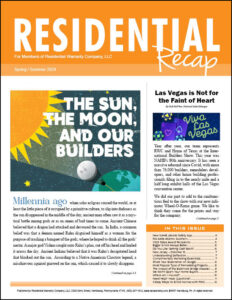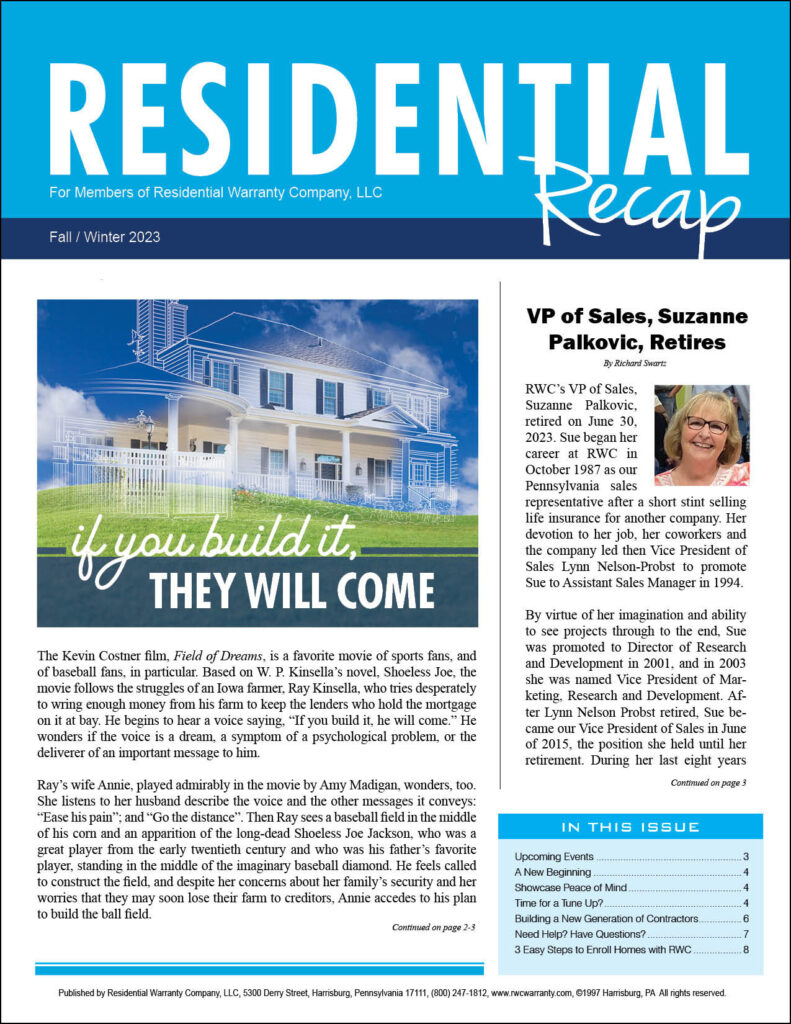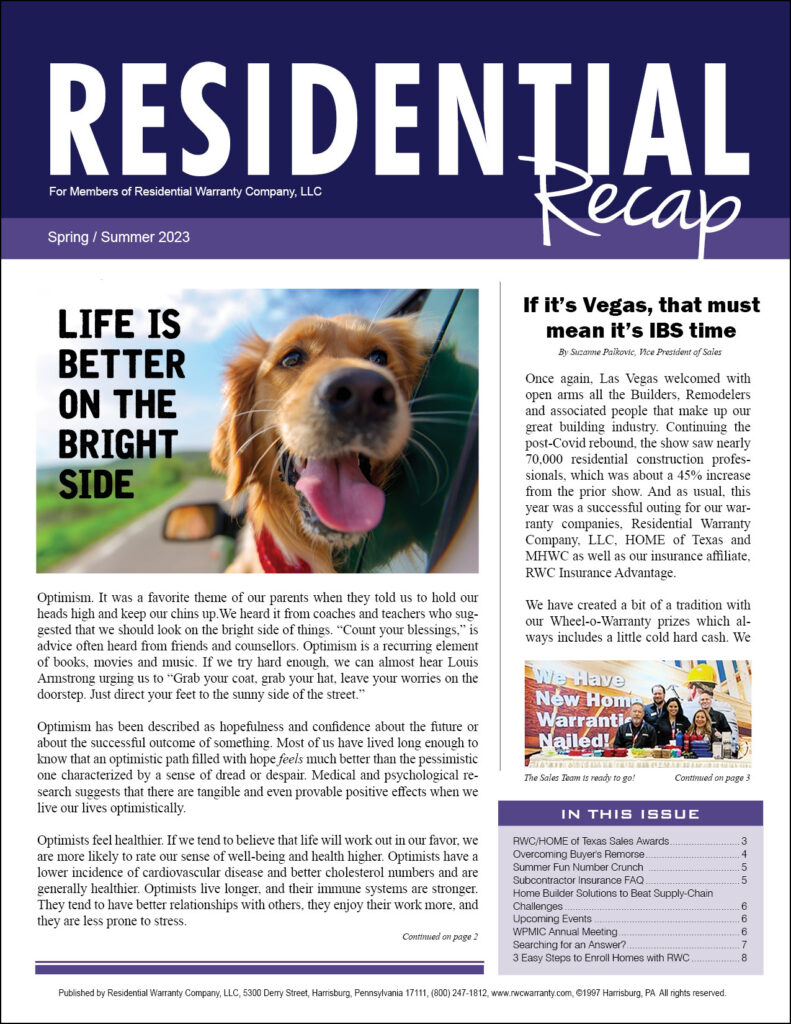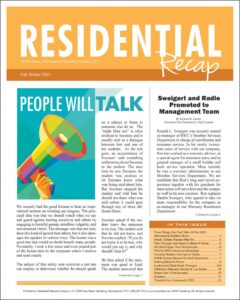Check out building/warranty/industry news, RWC announcements, upcoming events, etc.
Check out building / warranty / industry news, RWC announcements, upcoming events, etc.
 After decades of dedicated service and unwavering commitment, VP of Sales, Suzanne Palkovic, bid farewell to RWC & Affiliates this summer as she embarks on a well-deserved retirement.
After decades of dedicated service and unwavering commitment, VP of Sales, Suzanne Palkovic, bid farewell to RWC & Affiliates this summer as she embarks on a well-deserved retirement.
Sue began her career at RWC in October 1987 as our Pennsylvania sales representative after a short stint selling life insurance for another company. Her devotion to her job, her coworkers and the company led then Vice President of Sales Lynn Nelson-Probst to promote Sue to Assistant Sales Manager in 1994.
By virtue of her imagination and ability to see projects through to the end, Sue was promoted to Director of Research and Development in 2001, and in 2003 she was named Vice President of Marketing, Research and Development. After Lynn Nelson Probst retired, Sue became our Vice President of Sales in June of 2015, the position she held until her retirement. During her last eight years with the company, she managed our entire sales force and was a constant proponent of superior customer service for our builder members. Sue was a tireless worker for our company. Her strong leadership and keen understanding of the warranty marketplace contributed greatly to our companies’ success. We will miss her wit, her wisdom, her tenacity, and her dedication.
Sue is succeeded by our new National Sales Manager, Rich McPhee. Rich is new to the position, but not to the company, having served as a highly successful sales representative in the mid-Atlantic states for the last ten years. Sue had an opportunity to mentor Rich, and we are happy to report that he has hit the ground running.
Sue plans to travel, spend time with her family, and become more active supporting causes that are near and dear to her heart. She leaves RWC with our good wishes for a long, happy and healthy retirement and with heartfelt gratitude for many years of loyal service.
Check out building / warranty / industry news, RWC announcements, upcoming events, etc.
You’re a general contractor, a GC. Like it or not, you are responsible for everyone’s safety at your jobsites. That means anyone who may be there for any reason. Even trespassers who trip and fall over some debris left by your demo guy. That’s right. Even if you post “NO TRESPASSING” signs, you have some degree of care for any member of the public who is at your job site for any reason and gets hurt. What can I say? Life isn’t fair, then you get sued.
Any human activity involves risk. To really prevent having accidents at your jobsite you’d have to go back in time to that day when you decided to become a GC and decide to do something else. Until a time machine is invented, you’ll need General Liability (GL) insurance and you’ll want all your subcontractors to be adequately insured.
Why is GL insurance so important?
Let’s go back to the sloppy demo contractor who left the debris lying around for the trespasser to trip over.
If that demo guy doesn’t have insurance, your GL company will not only have to pay this claim; they will add the demo classification to your policy and charge you the extra premium. It’s hard enough to be sure your subs have enough insurance even when you require certificates each year.
For example, if one of your subs has a claim working for someone else and it reduces his/her limit of liability, that certificate you got a few months ago is suddenly out of date.
It says your subcontractor has $1,000,000 for each accident. Only now, the claim has reduced this amount to $500,000. Suppose one of your subcontractors had their GL coverage canceled or nonrenewed? If you’re listed as an additional insured on their policy you should receive a courtesy notice of cancellation… provided you asked for one and insisted it be shown on the certificate.
Either one of these possible scenarios can lead to a claim being made against your GL.
But what about that trespasser? Why should he be compensated for getting hurt while being illegally present on your jobsite? The answer has to do with the degree of responsibility you have to the public. Think of your own home as a jobsite. Let’s say you invite friends over to a Memorial Day picnic. You want them to be there. The last thing you want is for one of them to trip and fall over your garden hose laying in the yard because you failed to put it away.
The same is true for the delivery person and the guy who reads your gas meter. Then there’s the door-to-door salesperson or survey taker. You’re not as happy to see them, but you wouldn’t call 911 when they show up either. The one thing all these people have in common is a right to expect that you keep your yard, sidewalk and steps free of objects like your garden hose, stray toys and other debris when they come calling.
Even a burglar or a vandal is owed some degree of care. You can’t use excessive force to restrain a burglar and you can’t take the position that a trespasser should just watch their step if there is an unprotected hazard on your jobsite.
Failing to understand these things and take steps to minimize the hazards at your jobsite creates liability. Your subcontractors are your first line of defense against lawsuits.
Here are four things you can do to make sure your subcontractors are helping to reduce your chance of being sued:
• TRIP AND FALL HAZARDS that can’t be eliminated must be marked with signs, cones, reflective tape, etc., in such a way that they are obvious to the public.
• Require your subs to provide CERTIFICATES OF INSURANCE each year. These should show your subcontractors have their own GL coverage with limits of liability equal to yours.
• Insist that they name you as ADDITIONAL INSURED on their policies.
• Make sure they HOLD YOU HARMLESS in your contracts with them.
Never let up on your efforts to hold your subs to this high standard and to practice good jobsite preventive maintenance.
by Doug Davis, Eastern Atlantic Insurance Company
Click below to read about industry news, announcements, upcoming events, etc.
Stay up-to-date with the Warranty Company, Upcoming Events, & Industry News.
Why is it important to worry about safety when it comes to wet concrete? Because concrete is one of the most widely used construction materials there is, which means there are an untold number of workers who are exposed to these hazards on a daily basis. The biggest hazards include skin irritation, severe chemical burns, and serious eye irritation. Concrete can be safe when used appropriately and with the safety precautions below.
- Wet cement (an ingredient in concrete) is caustic, abrasive and drying, so protect your skin. Wear appropriate PPE such as tall rubber boots, pants, waterproof gloves and long-sleeved shirts.
- If concrete comes into contact with your skin, it’s important to immediately wash off with clean water and replace any wet clothing or PPE. Don’t wait!
- Be sure to wear eye protection when working with wet concrete. Your eyes can be seriously injured due to splashing concrete. Wear safety glasses with side shields or safety goggles.
- Wet concrete can conduct electricity. All electric tools should be grounded and used with care.
- When raising or lowering concrete chutes, be aware of pinch points. These can take off a finger or hand if you’re not paying attention.
- Protect your back. Place wet concrete via chute, wheelbarrow or pump, as close to the work area as possible. Concrete should be pushed, not lifted, into place.
- Use waterproof kneepads or a dry board when kneeling to place or finish concrete.
It’s important to understand that you may not experience any acute symptoms right away if wet concrete touches your skin. But if you don’t wash the area as soon as possible with cold, clean water, you could end up with a serious burn. If a burning sensation continues or worsens even after you’ve flushed the area with water, seek medical attention. If wet concrete splashes into your eyes, flush them continuously with clean water for at least 15 minutes and then go to the hospital.
Source: www.ccicomply.net
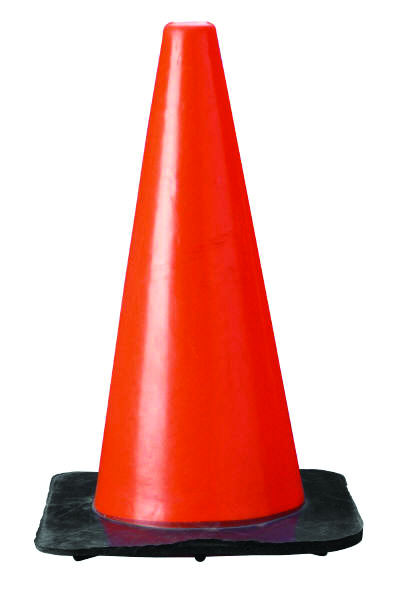 If you’ve been a builder for more than a few years you’ve been through a lot. When the housing bubble burst; you survived. Now that the market is better and your business is growing, you’re starting to realize the rewards of surviving. There are still plenty of challenges and one of them is to find qualified subcontractors.
If you’ve been a builder for more than a few years you’ve been through a lot. When the housing bubble burst; you survived. Now that the market is better and your business is growing, you’re starting to realize the rewards of surviving. There are still plenty of challenges and one of them is to find qualified subcontractors.
Recently, you started a new subdivision and hired a flat concrete contractor you’ve never worked with before, to put in the sidewalks. This morning you got a call from your new sub; the kind you never want to get. A woman was walking her dog next to your project around dusk last night. She tripped over a mason’s line that was left across a section of sidewalk that had been poured earlier that day. The new flat work guy left the site without setting up any cones, fencing or signs. In fact, he did nothing to warn the public of what is commonly referred to as a “trip & fall hazard.” The woman suffered fractures to both wrists as well as lacerations to her face when she fell. Her injuries will require surgery and she’ll be unable to work for several months. Her pain and suffering have yet to be determined.
Your new sub has his own general liability insurance that should respond to this claim. You required him to have his insurance company add you to his policy as additional insured. That way they will defend you if and when the woman’s attorney sues you as well as your sub. The certificate of insurance you required your sub to provide shows all of this. Everything should be fine. But, trip & fall claims can spiral out of control.
Disputes can arise over who should have protected the worksite. Subcontractors or, their attorneys, can argue that’s the general contractor’s job. You feel that you don’t have time to hover over every job site making sure each sub is placing the proper emphasis on safety. Besides, you hired them to do a job and that includes doing it safely. Doesn’t it? All your subs understand this, don’t they?
In most states, you as the general contractor, are ultimately responsible for worksite safety. That doesn’t mean the subs get a free pass. But it usually means the general contractor has to do more than just assume everyone is being safe. That means holding periodic safety meetings, making sure new subs understand what you expect from them before starting work each morning, during the workday and after shutting down for the night. Active worksites are dangerous places even when they are nothing more than a partially completed sidewalk in poor light where an unsuspecting woman takes her dog for a walk.
Holding regular safety meetings doesn’t have to take a lot of time or cost you much money. Meetings don’t have to be held every day; just regularly enough to make it clear to everyone concerned that you are committed to preventing accidents involving both the public and anyone else at your worksites.
The RWC Insurance Advantage is dedicated to loss prevention. To prove it, we offer up to 25% off your new general liability premium if you provide us with a copy of your written safety program. If you’re already insured with us, we’ll even offer the same incentive on your next renewal if you haven’t already received it.
Call us today at 866-454-2155 to find out if you qualify and receive a free, no obligation quote.

